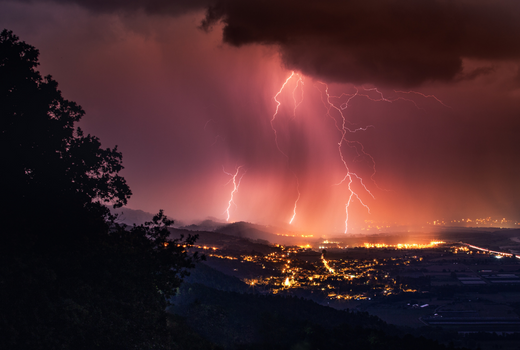Temporary accommodation for those impacted by recent flooding
Call Flood Recovery Hotline, 1800 560 760, (7:30am-7:30pm every day) for assistance with:
- finding accommodation and support that suits your needs
- clean-up
- mental health and wellbeing support
Storms can occur regularly throughout the year. They differ in severity and can cause safety risks to people, animals, households and businesses such as:
- roof damage
- flash flooding and
- damaged or fallen trees and power lines.
For a flood and storm emergency call Victoria State Emergency Services (SES) on 132 500. For a life threatening emergency call 000.
SES has prepared a short video to help you prepare for a storm:
Reduce the impact of storms
Preparation before a storm
Preparation before a storm
- prepare your Household emergency plan
- inspect and fix fences, roofs and gutters for damage or loose materials
- clean your gutters and downpipes frequently
- seal any cracks in the foundation and exterior walls
- ensure branches near your home and power lines are trimmed
- keep your yard or balcony/patio free from clutter
- check you have adequate insurance cover for your home and contents
- keep a list of emergency numbers near the telephone: for flood and storm emergency call VIC SES on 132 500.
- assemble an emergency kit
- help your neighbours to prepare their homes.
During a storm event
During a storm event
- stay calm
- listen to the radio for emergency messaging
- have an emergency kit handy
- move or secure objects from around your house and yard
- ensure children are inside
- stay clear of windows
- make sure that pets and animals are secure and have shelter, or bring them inside
- move vehicles into a garage or under shelter and away from trees.
If you're caught outside during a storm take shelter – but stay clear of trees.
Caught in your vehicle during a storm?
Do not drive into water of unknown depth and current. The majority of flood-related deaths in Australia happen when people drive into flood water.
Ensure your headlights or hazard lights are on and slow down or pull over. Be alert and watch for hazards on the road, such as power lines.
After the storm event
After the storm event
- check for damage to your house: if you need help from VICSES call 132 500
- continue to listen to the radio for information
- check on your neighbours
- stay well clear of creeks, drains, fallen trees, fallen power lines and damaged structures
- ensure children are supervised.
If flooding occurs
If flooding occurs
- avoid driving or walking through floodwaters. If you must enter floodwaters, wear solid shoes (not thongs or bare feet) and check the depth and current with a stick
- stay away from drains, culverts and water that is higher than knee-deep
- floodwaters may contain sewage, take precautions
- stay away from fallen power lines – electrical current passes easily through water
- if your car stalls in rising water, abandon it immediately and seek shelter above floodwater levels
- be aware that animals may enter your house during a flood, such as spiders and snakes, looking for drier areas
- wait for rescuers to come for you: avoid swimming to safety
- if outdoors, climb to high ground and stay there
- keep listening to a local radio station for information and advice
- keep in contact with your neighbours wherever possible
- be prepared to leave early, if required.
For more information, or if you require this information in another language, please visit the Victorian SES Translated Website.

